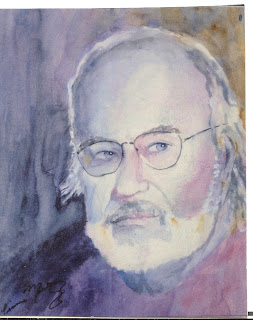ON THE DEATH OF A BIRD
The Rev. Dana Prom Smith, S.T.D., Ph.D. (11/15/05)
In the morning damp Gretchen found a fallen hummingbird lying on the cold stones of our front patio. At first we thought it dead, but when I went to pick it up, I saw it quivering with its long peak twitching as if it were thirsting for nectar. For a moment I did not know what to do, but then I heard the words of Jesus reminding me that God the Father kept his eye on the sparrow. If God did that, then the least I could do was to keep my eye on the hummingbird.
The hummingbird was beautiful with a bright bronze breast almost as though it were a miniature of an ancient, bronze-breasted Roman centurion. I took it off of the cold stone and placed it in the sun’s warmth on the railing of our deck in the backyard. It began to move a little more, trying to fluff its wings. Finally, Gretchen saw it fly off, and we were jubilant. Shortly she saw it lying on the ground below the deck. I brought it back to a table on the deck in the sun, and Gretchen gave it a cap full of nectar. Soon there was no movement. The bird was dead, and I buried it amidst peonies, a butterfly bush, and larkspur. I thought the burial plot fitting with enough nectar for the bird’s flight into the next world, something akin to the provisions left for the pharaohs in the pyramids for their journeys into eternity.
We felt helpless at the death of the hummingbird. We wondered why we were so moved at the death of a bird, but that soon became clear. It brought to mind our helplessness at the death of our mothers. We began Sigmund Freud’s "free association" and William James’ "stream of consciousness." Gretchen at first mentioned the death of her mother and that brought to mind the death of my mother.
Gretchen’s mother died just short of her 96th birthday, just after she had eaten breakfast and had decided the time had come to finish her journey on earth. She wanted to die alone, having made it clear to Gretchen that she did not want nurses hovering around her bed or Gretchen making a special trip east for her parting. She exemplified Alfred North Whitehead’s conviction that religion is what individuals do with their solitariness. If anything, dying is solitary and religious, and she quite appropriately wanted to die in God’s presence without the fuss and feathers of ministering distractions.
My mother died, her body riddled cancer, near Thanksgiving in her 67th year. In her dying moments there were those involuntary gasps, as the hummingbird’s, trying to hold onto life. Perhaps, I thought later that the gasps might have been gasps at the threshold of eternity. I held her hand as she died and kept speaking with her past the nurse’s futile attempts to usher me from the room. I suspect at the last she had gone within herself on that journey into the unknown, into the silence of eternity. That deep within ourselves is the only place to which we can repair when we are dying.
Then began a flood of associations, the death of my father of leukemia in his 58th year, the death of my grandfather of gangrene in his 85th year, and then a long line of parishioners with whom I had kept vigil at their deaths, children, adolescents, adults in their prime, and the old. The overwhelming sense was a dumbfounding helplessness. Nothing can be said or done. Whitehead was right. It is a solitary journey into a Void, the Void of God, and, therefore, silently a journey into faith.
What remains for the living is grief, the immense sadness of loss, an experience for which there are no words, as Saint Paul said, "with sighs too deep for words." Grief is an experience which, too, is ultimately solitary, and, therefore, a journey by faith into the Void.
I wonder what people, particularly journalists and newscasters, mean when they say "closure." I think they mean nothing at all, except they want to walk away from someone else’s grief, leaving the grief-stricken unattended, afraid, as they are, of the pain of their own grief. There is no closure. If there were, we would be nothing more than machines, automatons without heart and soul.
The death of those who bore us, nurtured us, and abided with us in far more than the death of someone else because we are in their lives and they in ours. They shaped our identity, our sense of ourselves, and with those losses there is never any closure. We are more than a being. We are a becoming, and for that there are no closures, only openings.
It does not take much to scratch a person’s surface to find the openings, the openings to depths. All it takes is the death of a bird.
Copyright © 2005 Dana Prom Smith


0 Comments:
Post a Comment
<< Home